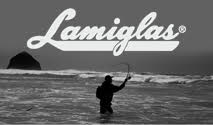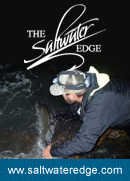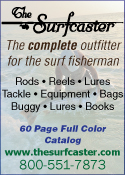I am fresh off a relaxing family vacation to Cape Cod; the former surfcasting capital of the world and home of some of the tastiest looking sand beaches you’ll find anywhere on the planet. I have been visiting the Outer Cape, on and off, since I was a little kid and fishing the beaches was one of the things I used to look forward to most—I have gone for a week each of the last four years and I have brought a rod with me exactly zero times. You may be questioning my grit as a surfcaster or my devotion to the sport—but unfortunately it’s not that I’m going soft, it’s that I have learned that it’s just no longer worth my time.
On our first day, we headed to Coast Guard Beach in Eastham; this beach makes up the northern edge of the famous Nauset Inlet and then stretches two or three miles before being shadowed by the majestic dunes the Cape Cod National Seashore is so famous for. As we picked our spot among the sunbathers my mind slipped into overdrive and went through an involuntary rundown of the tide, wind, current structure and wave action. At roughly the same time my conscious mind was running through stories I’d heard or read by many of the surfcasters that made their names on the Cape beaches from the 1960s through the early 2000s.
By chance, (or was it?) we sunk our umbrella right in line with a cut in the offshore bar. The tide was low and coming in, a quick scan with the Costas revealed that a deep hole accompanied that offshore cut and a long finger bar reached out to meet the water flowing in from the Atlantic. Words from the late Tony Stetzko began to float through the back of mind as I walked through the shallow cut that was carved by the incoming water as it eroded the base of the finger bar and spilled over into the next bowl. I remembered him telling me about some amazing nights where big bass were slurping sand eels in a spot just like that. Dozens of fish, all over 30 and some over 40 working that little nearshore jet of current—their backs fully exposed—a swimmer and dropper reeled with the rod tip almost jammed into the sand getting eaten almost every cast. And when the school cleared, you’d drive down to the next bar and find another pile of fish ready to play.
I am not a sand fisherman. I’m not saying I can’t do it or haven’t, but I like my boulder fields and I like my deepwater rock formations. But as I walked out onto that finger bar and saw how steeply the water dove off from inches deep to well over 10 feet, my brain was on fire—it took some serious willpower to keep myself from playing the fisherman’s version of air guitar as I placed imaginary casts in my head. It was one of those places where you look and you just know that fish would be there—or, rather, should be there.
The current, the structure, the exchange of water between the ocean and the trough, the water jets rushing downtide between the bowls… sheer perfection. I really wished that I’d brought a rod… but the one thing I’ve left out of is that there were four huge seals and a smaller harbor seal swimming with the sunbathers in that hole. Looking south, the next bar was a “table top” (not connected to the shore) and there were easily 200 seals basking on the sand and another 50 sitting submerged with their heads poking out of the water like turtles, gawking at the gawkers shooting pictures.
As the week progressed we hit Lecounts Hollow and Marconi Station Beach—each of them had their own angling charm and their own armies of seals. When I visited those beaches at dusk I saw a single caster fishing with a small panel of seals hoping he’d luck into a fish so they could take it. People have told me that the seals know to follow people carrying surf rods and now I’m a believer. I was able to talk to one of the surfcasters, he told me that it has become a game of perseverance on the Cape beaches, you have to fish a lot of nothing days and nights to get into a few fish for the season. He did tell me that the beach I was walking had a good shot of fish the night before, but it was all seals after that—he added that a fish over 20 pounds would be considered extraordinary these days.
There are a lot of emotions that surface when I walk any of the Outer Cape beaches, they will be forever tied to my soul and childhood. I remember in all of the years we went between 1990 and 1998 I saw FOUR seals and they were all together in one spot as I was walking out to Nauset Inlet. When I see hundreds and thousands now it kind of breaks my heart. The Cape used to be known for its fishing and anyone had a decent shot off of those beaches. I remember seeing dozens of buggies with rods in the bumpers, big fish in the coolers at the shops, photos galore on the shop walls and now, there is no draw for surf fishermen on the beaches. I have no doubt that there are some hardcore locals that have figured out how to fish around the seals, but for average Joe or even the seasoned traveling surfcaster, the only things left of those bygone years of world class striper fishing are the stories and the memories. Too many seals is no good for anyone—I hear rumors that the State may step in to thin the herd a bit, but until someone is killed by a great white in plain view of thousands of vacationers, I doubt very much that any action will be taken. I didn’t even get to enjoy those great years on the Cape and I miss them, I can only imagine what it must be like for the guys who actually lived it.













Dave,
↓Not only do the seals know to follow a fisherman, they also know when you are fishing as opposed to standing around. On Nantucket, at a place called the “Galls” (not sure if that is the correct way to spell it), the seals will set up a skirmish line in front of active fisherman. If you all put your rods back in the rod racks or sand spikes and fold you arms, the seals will disperse. That had happened on more than one occasion. If you pick up your rods and begin to fish the seals will reappear.
The seals on Nantucket had become very aggressive, actually coming out of the water (onto the beach) to grab a fish if you didn’t get there first.
The moratorium on the killing of these seals has ruined the surf fishing on Nantucket, as well as on Cape Cod. Too bad for such great, legendary, fish-able water.
Dave:
Re: “Too many seals is no good for anyone—I hear rumors that the State may step in to thin the herd a bit, but until someone is killed by a great white in plain view of thousands of vacationers, I doubt very much that any action will be taken”.
Does the probability of someone being killed by a great white shark in the surf zone increase or decrease as the seal population increases?
↓The numbers are sobering. Estimated 15,000 seals cape and islands, average 500 pounds, eat 6% of their body weight per day. 450,000 pounds, 225 TONS of fish eaten each and every day cape & islands.
↓I used to love fishing the Cape . Spent many weekends down there and quick trips at the report of a blitz going on. Not these little pushes of fish we sometimes see now but days of good 30 to plus 50 lb fish. Plugs,chunk bunker,eels,sand eels it all worked. The seals started showin in 95. Memorial day weekend 4 am walked out from the lighthouse and found myself in the middle of what looked like a boulder feild. Turnrd on my headlamp an found myself in the middle of over 100 seals. I backed out of there quick. You can’t fish the Cape or Nantucket anymore. Tony ,may he rest in peice, told me nights are the best but not perfect. After loosing a couple battle for fish with 500lb seals I do the night mainly but still get nailed by a seal from time to time. It’s a shame and like you said till someones kid gets nailed by one of these pests nothing will be done. As food sources deminish they look for other food. I miss the old days they weren’t perfect but better than now.
↓I hope this isn’t portending the future for Montauk and Long Island beaches. We seem to have seals sticking around Jones Inlet now year round. Had one swimming off the beach by Pt Lookout last week.
↓Early last October, I had a giant one pop up next to me in the middle of the night as I fished on a rock off the North side…to say it scared the @#$ out of me was an understatement. Needless to say, I decided that the action for the night was finished at that point. Let’s face it, there just aren’t enough sharks off of Cape Cod to control the seal population.
I laughed reading the first part of the story, as I go through the same mental gymnastics when I visit those exact beaches with the family every summer, as I have been for the last 5 years or so. While I do occasionally get lucky with some topwater bluefish action at first light, I know the fishing there is a shadow of what it used to be. Every year, it seems that there are more seals and less fish. There are a couple of really great independent tackle shops on the Cape and I support them when I can, but that’s got to be a tough business if you’re not right on the canal.
↓Does the probability of someone being killed by a great white shark in the surf zone increase or decrease as the seal population increases?
↓was there over the week of the 4th, and they absolutely shadow you. Maybe we’re relegated to fishing for other species like fluke or tautog from shore. at least we’d have a slim chance to land something before its gobbled up. Coincidentally, the problem is slowly branching out to Plymouth and beyond. Manomet gets overrun now. Plymouth Harbor has lost a few spots as well. As long as they continue to be “cute” we’ll continue to do nothing about them. God, why did i waste so much time chasing 2 lb largemouths around the local hole when I was a kid?
↓The last year I fished the cape 2001 I had a few hooked fish eaten by seals and lost a few SS darters. I haven’t been back. I really do miss the fishing there. But the seals ruined it 4 me.
↓The presence of all those seals brings great whites to the area in greater numbers. If you watched Shark Week ( Seal Island installation ) you will see how they have adapted to hunt seals, and a 500# seal is dinner.
↓More seals=more sharks in closer proximity to you. Don’t go in the water looking like a seal !
Dave, Thank you for your elegantly written poignant story of the impact of the gray seal invasion on recreational angling on the beaches of your beloved Cape Cod. Here on Nantucket Island we are overwhelmed and are taking action. We have established the Seal Abatement Coalition (see http://www.sealabatement.com) and are working through a political process to establish the fact that the gray seal population has rebounded sufficiently to warrant their removal from the extraordinary protection afforded them under the Marine Mammal Protection Act. A management plan must now be put in place. We are determined to mount a full courts press on the powers-that-be. Please send me your email address at pfkrogh11@yahoo.com if you would like us to keep you posted on our progress. This invitation is extended to others who have commented on your timely, well-crafted report. Cheers. Onward!
↓Last two years I tried to fish Nantucket only to be surrounded and shut down by a crews of seals.
↓They absolutely know who is fishing and who is not. It’s a shame that these beaches, which are some of the world’s most beautiful, are unfishable unless you want to be bullied by these opportunistic pests.
You think your alone then one pops up, which attracts another,…and next thing you know your surrounded and they are all staring at you waiting for your rod to bend, it’s annoying and intimidating.
I’ll never waste the travel time or money for that again.
Didn’t you used to get $5 for every seal nose you turned in to the government.
…go to Google Earth and zoom in on Monomoy. You can see 1000’s of these pesky bastards FROM SPACE! My suggestion is to allow someone with an Australian Cattle Dog (or equivalent) to harass the seals back into the ocean once or twice a day & let the sharks thin them out…
↓As Scott Cunningham commented above I’m afraid montauk is headed the way of the cape. At least a few dozen seals live there year round and they will and have attacked fish that are hooked. Last year a friend fishing False Bar was into small fish and while fighting a bass a seal grabed the fish. He lost the fish, the plug and a good amont of his braid. Oh yeah and this occurred in the dark, after 11pm!!! Surf fishing as I’ve know it for 50 years is changing very quickly.
↓